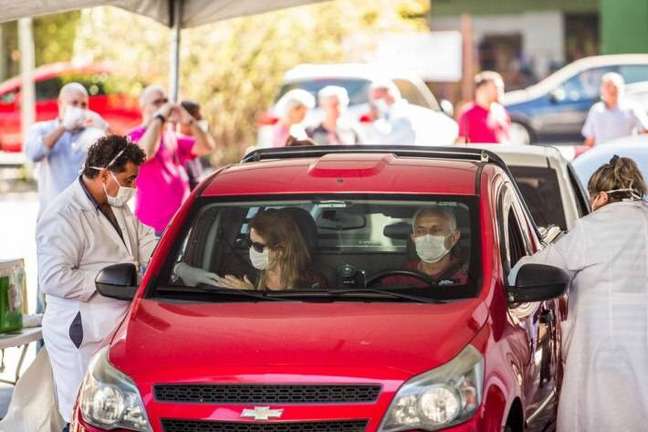The World Health Organization maintains the state of international health emergency for the disease caused by the coronavirus; Europe begins to see a new high, but Brazil does few tests
About two-thirds of the world’s population has received at least the first dose of one of the vaccines against COVID-19but the inequality between vaccination rates in different places was one of the factors taken into account by the World Health Organization (WHO) to maintain the state of international health emergency for the pandemic of the disease last October 19.
“Although it is obvious that the global situation has improved since the beginning of the pandemic, the virus continues to mutate and uncertainties and many risks remain,” said WHO Director General Tedros Adhanom Ghebreyesus. In total, the world had 6.1 million
The chair of the WHO Emergency Committee, surgeon Didier Houssin, said that, since the start of the pandemic, it was the first time the group had thought of revoking the international emergency declaration. Uncertainties such as the possibility of evolution of the virus, which can mutate and escape the immunity conferred by vaccines, and the difficulty of calculating the clinical impact of future variants on national health systems and the complications of the disease have weighed.
For Carlos Magno Fortaleza, infectious disease specialist and professor al Paulista State University (Unesp), further care is warranted. “The World Health Organization has a very clear idea of the demobilization of actions in relation to the covid that will take place when it declares that the pandemic is over; a domino effect of dismantling the networks of diagnostic laboratories, closing of the beds for the hospitalization and reduced surveillance of the occurrence of new cases, “he assesses.
Current scenario
The arrival of vaccines has brought the world closer to the end of the health threat posed by Covid-19. Even so, according to data collected by the Covid-19 Analysis Network, about 30% of the world population is protected with the booster dose applied after the first two doses of the immunizer. But this vaccination coverage is discrepant: on the African continent, for example, the booster dose was administered to less than 5% of the inhabitants.
In addition to the chances that large numbers of non-immunized people increase the chances of developing a resistant variant of acquired immunity thanks to available vaccines, the unpredictable behavior of the virus also worries specialists. As polls such as Fiocruz’s InfoGripe Bulletin point out, SARS-CoV-2 still does not show a clear pattern of seasonality, unlike other respiratory infections.
“Obviously it’s better than before because it has vaccines, but compared to other diseases that also have vaccines to prevent deaths and reduce hospitalizations (like flu and measles) and compared to itself in the last six months, covid-19 is still strong in many countries “, underlines Isaac Schrarstzhaupt, researcher and coordinator of the Covid-19 Analysis Network.
In the last 50 days, the countries of the European Union have experienced the growth of moving averages which show the increase in deaths and new cases of the disease. On October 9, the seven-day moving average of the growth rate of new cases in the block was 40.53%; 20 was 67.87%.
“Europe is in a very visible wave where cases have increased, 15 days later, hospitalizations and now deaths are on the rise. When we look at Brazil, we don’t see this movement, but there is a problem: we have almost stopped testing “. Schrarstzhaupt explains.

End of the state of emergency
For the Unesp professor, the importance of tests increases in view of the flexibility of preventive measures against covid-19 and even more in consideration of the end of the state of international health emergency. The possibility of identifying a possible upward trend, he analyzes himself, is the price to pay for the withdrawal of the measures to be carried out with a certain tranquility.
“What we have to very intensively maintain is the diagnostic laboratory network and the accuracy of epidemiological surveillance. We have to maintain this state of alert, which is different from the restrictive treatments we have to maintain in previous years,” he points out.
Although the situation of the virus will not be uniform around the world, Charlemagne predicts that the WHO’s decision to lift the state of emergency will have to take into account technical and political aspects. “It will probably consider the disease situation in countries that are most connected to each other by travel and migration routes, because these are the main potential disseminators, even if some more peripheral or less connected country is still experiencing an uncontrolled situation,” explains.
The expectation is that the situation will be reassessed at the end of the year, with the possibility that, this time, the end of the pandemic emergency will be decreed. / WITH INTERNATIONAL AGENCIES
+The best content in your email for free. Choose your favorite Earth Newsletter. Click here!
Source: Terra
Benjamin Smith is a fashion journalist and author at Gossipify, known for his coverage of the latest fashion trends and industry insights. He writes about clothing, shoes, accessories, and runway shows, providing in-depth analysis and unique perspectives. He’s respected for his ability to spot emerging designers and trends, and for providing practical fashion advice to readers.





-s4mtc70aep12.jpeg)

